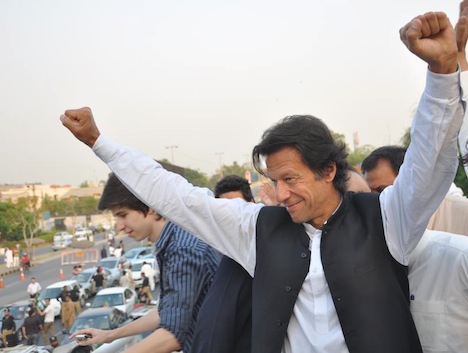The final days leading up to Pakistan’s general election this weekend have been dominated by the fate of one man — Imran Khan.![]()
With tensions running high over campaign violence, Khan this week was seriously injured, though not by radical Islamist elements, but by falling off a stage at a campaign rally.
Khan tumbled seven feet Tuesday after falling from a forklift when another staffer lost his balance at a campaign rally in Lahore, the capital of Punjab province. Khan suffered three broken vertebrae and additional head injuries, and Pakistan’s other parties suspended campaigning on Wednesday out of respect for the man who’s become the star of the 2013 campaign. Khan will not be able to headline any further rallies before the election (today is the final day for active campaigning, in any event), and he won’t physically be able to vote in person on Saturday, either, but he’s already recorded a message for supporters from his hospital bed.
While the fall may have dampened the prospects for a final campaign rally, it may well have compensated by catapulting Khan into 36 hours of news coverage throughout Pakistan and stepping on the economic reform message of former prime minister Nawaz Sharif, whose Pakistan Muslim League (N) (PML-N, اکستان مسلم لیگ ن) was expected to win the largest share of the vote.
But even before the fall, Khan was always going to be the key to determining the outcome of Pakistan’s parliamentary elections.
Some polls show that Khan and his surging nationalist, anti-corruption movement, the Pakistan Tehreek-e-Insaf (Movement for Justice or PTI, پاکستان تحريک) was already gaining ground against both Sharif’s PML-N and the governing Pakistan People’s Party (PPP, پاکستان پیپلز پارٹی).
A Herald poll earlier this week showed the PML-N with 25.68% support and the PTI with 24.98% support, a statistical dead heat, with the PPP in third place with 17.74% — notably, it showed Khan trailing the PML-N by only single digits in the populous Punjab province and with a huge lead in Khyber Pakhtunkhwa province in Pakistan’s northwest.
So who is Imran Khan and how did he become the fulcrum of Pakistan’s 2013 elections?
Khan is a former cricket star, and he led Pakistan’s national team to victory in the 1992 World Cup. Thereafter, Khan entered a career philanthropy — he founded the very hospital where he’s currently recovering from the injuries he sustained on Tuesday. But he ultimately settled on politics and he formed the PTI in 1996 to great fanfare with an anti-corruption message that applied equally to the PPP-led government of Benazir Bhutto and the Sharif-led government that would eventually win the 1997 elections. In 1997, however, the PTI managed to win just 1.7% of the vote and no seats.
During the era of military rule that began in 1999 under Pervez Musharraf, and with Bhutto and Sharif in exile abroad, Khan found himself initially drawn to Musharraf, hoping that a period of military rule would eliminate the rife corruption that plagued both the Bhutto and Sharif governments, and Khan was elected to the National Assembly in the 2002 parliamentary elections that were dominated by Musharraf’s allies. He increasingly soured on Musharraf’s rule, however, and resigned from the parliament in 2007 to protest Musharraf’s attempt to run for president. In the February 2008 elections, however, Khan and the PTI boycotted the elections that Bhutto’s widower, Asif Ali Zardari, now Pakistan’s president, won as the head of the PPP.
He’s always been somewhat of a quixotic crusader, but he’s been open to charges of being somewhat of a charlatan over the years — critics point to a history of opportunistic moments in support of Musharraf, boycotting the previous elections, espousing increasingly anti-American rhetoric, and they argue that he’s a charismatic Pakistani Peter Pan who’s more debutante than dealbreaker. But the biggest factor working against him is also the one that makes him so popular — he represents a massive rupture from Pakistan’s cozy status quo:
In the end, Khan’s popularity probably won’t be enough, because the dynasties, consisting of a few dozen families, use the old parties to ensure that they remain in power. Party members enjoy lifelong benefits, and the closer an official is to the old guard — at the feeding trough, so to speak — the more he personally benefits.
These are the methods of President Asif Ali Zardari’s PPP, but also of Sharif’s Pakistan Muslim League. Even minor supporters can hope for crumbs: government contracts, jobs, a little money. This is still better than nothing in a country that has no functioning social network aside from the one fueled by corruption. This is why outsiders like Khan, people who want to upend the system, hardly stand a chance.
For now, though, Khan is still the most popular politician in the country, stemming from his populist espousal of two basic positions.
The first is the same anti-corruption platform that he’s been trumpeting for the past 17 years, but with Zardari, not so affectionately known as ‘Mr. Ten Percent’ for his propensity to graft, and the PPP government now incredibly unpopular, Pakistani voters are giving Khan a new look. Unlike Zardari or Sharif, he doesn’t come from the wealthy, landholding elite that’s held a stranglehold on civilian Pakistani politics in recent decades nor does he come from the military that’s nearly as corrupt.
The second is a newer position, but perhaps even more powerful — he’s been the most outspoken candidate in opposition to the U.S. drone strikes launched in the tribal areas along Afghanistan’s border, and he led a peace march to the border of Waziristan last autumn. If Khan were to become prime minister, he would not become an anti-American prime minister, and it’s clear that the deep links between the Pakistani military and U.S. defense forces would continue as strong as ever. But Khan has indicated that he’ll take a much harder line in defending Pakistan’s national sovereignty and demanding that U.S. forces respect it.
That’s made for some odd bedfellows. The threat of violence from Tehreek-i-Taliban Pakistan (TTP, تحریک طالبان پاکستان), known as the ‘Pakistani Taliban’ has virtually brought public campaigning by the PPP and the MQM to a standstill, and the effect has even chilled and muted the PML-N campaign, especially outside Punjab province. But the TTP has given Khan a pass because of his anti-drone campaign, which is why Khan has been able to zip across the country holding public rallies with more impunity than the PPP’s leaders.
Not only has Khan attracted young and urban supporters, he is rumored to have support from within the military community now, too, which would likely benefit from a hung parliament and a weaker coalition government. Khan has even converted supporters from inside the current government — Shah Mehmood Qureshi, Pakistan’s foreign minister from 2008 to 2011, left the PPP to become the vice chairman of Khan’s PTI.
Despite his momentum, there’s some reason to doubt that Khan will win more seats than the PML-N or even the PPP. That’s because so many of the 272 spots in the Pakistani National Assembly are determined in rural constituencies across Pakistan. That gives Sharif, whose heartlands are the rural parts of Punjab province, an institutional advantage. It even gives PPP a built-in stronghold among rural areas in Sindh province. Moreover, the political machine of the Karachi-based Muttahida Quami Movement (MQM, متحدہ قومی موومنٹ) is likely to have sewn up many of the urban constituencies in Pakistan’s largest city, leaving Khan largely shut out of Karachi as well.


2 thoughts on “Despite his tumble, Imran Khan is the key to Saturday’s Pakistani election”